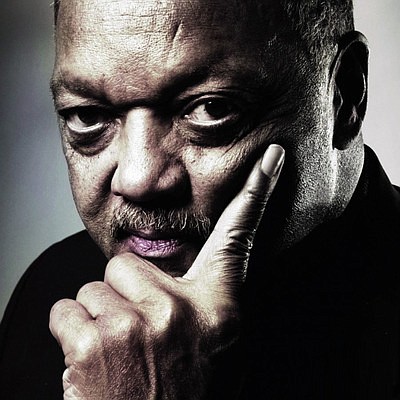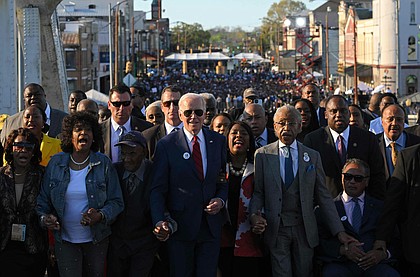Selma's Mirror
Jesse Jackson | 3/7/2023, 2:51 p.m.
The Edmund Pettus Bridge in Selma, Alabama, is famed as the site of Bloody Sunday, the violent 1965 police riot that sparked a national outrage powerful enough to drive the Voting Rights Act through the Congress. This past weekend, my son Jonathan and I joined with President Biden, political leaders, ministers and veterans of that march to commemorate that terrible day.
Nearly 60 years later, in this time of toxic partisanship and venomous reactionary movements, dismay and pessimism are commonplace.
Republican leaders remain in thrall to Donald Trump and the angry MAGA movement he leads. Rep. Marjorie Taylor Greene of Georgia echoes the pre-Civil War South calling for a national divorce, dividing red states from blue states. Florida Gov. Ron DeSantis roots his upcoming presidential campaign in what he calls the battle against “woke,” with a central focus on censoring the teaching of the history of slavery, outlawing any mention of institutionalized racism, and banning books and instructions that might make any student feel guilty. Across the country, prosecutors seeking to limit mass incarceration and reform the police are charged with being soft on crime. The Supreme Court, having gutted the Voting Rights Act and turned a blind eye to partisan gerrymandering, now seems intent on outlawing affirmative action.
The return to Selma helps put all this in perspective. In my lifetime, the nation has been transformed. Hotels and restaurants in Alabama now serve Blacks and whites routinely. Public transportation is open to all. Universities and colleges are integrated. Blacks, whites and other people of color play with and against one another on the playing fields. The U.S. military is integrated. While Republicans in the South and elsewhere have pushed to make voting more difficult, particularly targeting minorities, Blacks still vote in large numbers.
Moreover, the merchants of hate aren’t faring all that well. Trump lost the popular vote in both of his runs for the presidency. Trump’s hand-selected candidates lost badly in the 2022 congressional races. Georgia re-elected its Black senator, the Rev. Raphael Warnock. The numbers of Blacks, Latinos, Asian Americans and women in leadership positions continue to expand.
And of course, the younger generations – including the millennials, the most numerous of all – are more diverse, more open-minded and more liberal that their predecessors. Part of the reason Trump, DeSantis and the far-right movements rail at the moon is that progressives have largely won the culture wars. Republicans got a taste of that after the reactionary Supreme Court majority overturned Roe v. Wade and took away women’s right to control their own bodies.
While much progress has been made, much more remains to be done. Murderous expressions of the institutionalized racism of our ways of policing capture headlines all too often. Our public schools are sadly more racially divided than they were half a century ago.
Most important, the final stage of the Civil Rights Movement that transformed America – the campaign against poverty – remains unfinished. The divide between rich and poor is wider than ever. America fails working and poor people of all races, from cradle to grave. Our maternal health is worst in the developed world; childhood poverty and homelessness, the absence of universal preschool and after-school programs, the decline of labor unions, minimum wages too low to live on, health care too expensive to afford, retirement support too little to provide security – poverty and inequality shame the nation that calls itself the richest in the world.
Here the poisonous politics of racial division has its biggest effect. From the plantation South to today, racial fears have been manipulated to help keep working and poor people turning on one another rather than to one another. Dr. King’s final mission when he was taken from us was to assemble a poor people’s campaign, across lines of race and religion and region, to demand basic economic rights.
At the end of World War II, Franklin Roosevelt, in his final State of the Union address, argued that we had learned that “true individual freedom cannot exist without economic security and independence.” This truth, he argued, had become “self-evident,” part of a new Bill of Rights, including the right to a “useful and remunerative job,” the right to an adequate income, the right to a decent home, the right to adequate medical care, the right to education, the right to “adequate protection from the economic fears of old age, sickness, accident and unemployment.”
These rights, he argued, spell security – and security is essential to freedom and to democracy. Today, we witness the despair and the anger that comes from undermining that security. And we see once more the cynicism of politicians and patriarchs who rouse fears about race or about immigrants to distract and divide. Roosevelt’s assumption came nearly 80 years ago. Dr. King’s movement nearly 60 years ago. Now it is up to new generations to fulfill that promise and vision.
You can write to the Rev. Jesse Jackson in care of this newspaper or by email at jjackson@rainbowpush.org. Follow him on Twitter @RevJJackson.











